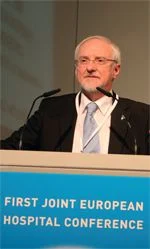HealthManagement, Volume 14, Issue 1/2012
2011 Saw the Start of Your Mandate of President of EAHM. How was Your First Year in Charge and What did You Accomplish?
As I have been active member of the association (Board and Executive Committee) for a long time now there is a certain continuity within the Presidency. The main activities of my Presidency focus on the implementation of the results of our reflection process; this is a perquisite for the future success of our association.
In addition, we prepared a very successful conference with our like-minded European associations, HOPE and the AEMH.
In Your Opinion, What Were the Three Most Important Developments in 2011 for European Healthcare and Hospital Management and Why?
The most important development in European healthcare was and is the European Directive on Patient Rights in Cross-Border Healthcare. Due to its significance, it was the main focus of the conference in Dusseldorf.
Demography is another huge issue for European hospital management. Increasing numbers of ageing patients require treatment and there are less young people available to provide this care. The average age of healthcare workers is also increasing. These developments require new management techniques.
Of course, debate on the future of the euro and the financial crisis was also an important issue in 2011. The effects of this crisis will also concern hospitals.
Looking Forward to this Year. What do You Think Will be the Three Most Important Issues in 2012?
The financial crisis will continue to affect our hospitals. Managers from across Europe are facing the challenge of securing healthcare delivery with ever tighter budgets.
A growing problem, in Germany at least, is the lack of specialists and skilled professionals. This requires new methods of recruitment, personnel management and organisation in our hospitals.
The First Joint European Hospital Conference Took Place in November. What is the Significance of this Event? Will There be a Similar Conference in 2012?
The conference was a great success with informative presentations from experts and discussions focused on the impact of the new European Directive on cross-border health for European states and for hospitals in particular.
Of particular significance was the collaboration of hospital management and senior clinicians. Together with the policy representatives, the prospects for healthcare in Europe with regards to the new directive and European policy in general were discussed.
Through this conference the great value of healthcare for European cohesion and development has become particularly clear and the health minister of Luxembourg set high standards for future developments.
This Issue, Our Cover Story Focuses on “Good Governance”. What is Your Idea of Good Governance?
Good leadership, or governance means to me to create particular conditions so that employees can have success in terms of the agreed targets. This includes, above all, trust. To achieve this, a culture that ensures trust must be created and maintained. Managers must set an example here. In order to implement good governance it is good practice to make arrangements within the company and provide:
- A model with the business goals of the organisation;
- Principles of leadership and cooperation (e.g. error handling, conflict management); and
- Instruments for implementation (e.g. structured annual employee meetings, staff introductions, rules for meetings).
This Issue We Have Included a Pharmacy Supplement. Undoubtedly One of the Most Expensive Departments in the Hospital, How Important is it for Hospital Managers to Keep Up to Date With Developments in Pharmacy?
With shrinking budgets, hospital managers are constantly being tasked to identify cost effective solutions whilst maintaining both the quality of the healthcare services and the performance and efficiency of their hospital. Pharmacy, being one of the major cost centres within the hospital, often finds itself under the microscope. Hospital medicine use has effects on ambulatory care, is difficult to manage and is frequently used in complex clinical situations. It is therefore, of paramount importance that the hospital manager is kept abreast of developments within the pharmaceutical field.
What is the Most Difficult Management Decision You have Ever Made and Why? (Please Explain the Context and Result)
I cannot name any individual one(s) here but the hardest are always personnel decisions. In order to make these decisions responsibly we must follow the rules of Good Governance.


![Tuberculosis Diagnostics: The Promise of [18F]FDT PET Imaging Tuberculosis Diagnostics: The Promise of [18F]FDT PET Imaging](https://res.cloudinary.com/healthmanagement-org/image/upload/c_thumb,f_auto,fl_lossy,h_184,q_90,w_500/v1721132076/cw/00127782_cw_image_wi_88cc5f34b1423cec414436d2748b40ce.webp)



